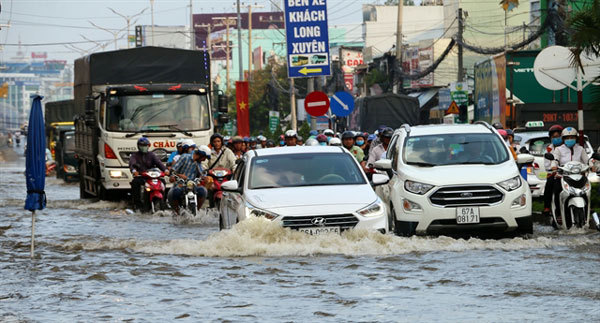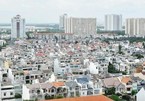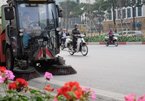 |
| High tide flooded a section of National Highway 91 which passes through My Quy ward, Long Xuyen City, An Giang Province on October 1. VNA/VNS Cong Mao |
He made the statement at a workshop entitled Improvement of Policies and Legislation to Respond to Climate Change in Vietnam, organised by the Committee of Science, Technology and Environment (CSTE) and the German Corporation for International Cooperation (GIZ) on Monday.
The workshop is aimed at identifying gaps and inconsistencies in the legal framework, hearing the opinions of relevant ministries, provinces and experts and consulting on the proposed amendments and supplements to the Law on Environmental Protection from 2014 in terms of climate change-related issues.
Responding to climate change has been integrated in the policies, legislation, programmes and development plans of the country, Tri said.
The Law on Environmental Protection was approved by the National Assembly in 2014.
“It was the first time climate change response was enshrined in law, with 25 provisions in 10 articles in Chapter IV.”
However, after five years of implementation, the legal framework for responding to climate change should be further improved to meet the demands of the new situation, he said.
Trí suggested supplementing two clauses to Article 39 of the law. These clauses consist of climate change response, including human activities to adapt to climate change and reduce greenhouse gas emissions; climate change response associated with sustainable development and strengthening the resilience of the natural and social systems.
He also proposed adding some other clauses including those encouraging the collection, recycling, use or destruction of ozone depleting substances or controlled by the Montreal Protocol in civil and industrial refrigeration appliances when they are no longer in use.
Addressing the workshop, Dao Anh Dung, vice chairman of Can Tho City’s People’s Committee, said, like other localities in the country, the city was suffering from the impacts of climate change. It was reflected in the fact that extreme weather occurred more regularly.
“High tides and river bank erosion has seriously affected the lives and production of local residents,” he said.
Marcel Reymond, head of the Economic Cooperation Embassy of Switzerland in Vietnam, said due to climate change, the Mekong Delta region suffered from US$130 to $190 million in damage every year.
“It was essential for Vietnam to further strengthen its legal frameworks and policy as well as improve technical standards to have an integrated implementation process,” he said, adding that the integration must be done separately at different levels from the Government, scientists, experts and communities.
Lam Van Bi, vice chairman of Ca Mau Province’s People’s Committee, proposed the Government allow the province to pilot the capital mobilisation of enterprises involved in climate change response and erosion control in the province. Accordingly, enterprises could exploit a certain land area to compensate the construction of the works they invested in the locality.

HCM City urged to reduce GHG emissions from buildings
The Japan International Cooperation Agency (JICA) has advised real estate developers in HCM City to apply advanced technologies while constructing commercial buildings to reduce greenhouse gas (GHG) emissions.

Hanoi takes initiative in reducing greenhouse gas emissions
Hanoi will implement more environmental projects, keep the current 104 lakes clean and build more wastewater treatment plants.
VNS
 In response to climate change, amendments to some parts of the 2014 Law on Environmental Protection are necessary, said Truong Duc Tri, Deputy Director of the Department of Climate Change under the Ministry of Natural Resources and Environment.
In response to climate change, amendments to some parts of the 2014 Law on Environmental Protection are necessary, said Truong Duc Tri, Deputy Director of the Department of Climate Change under the Ministry of Natural Resources and Environment.